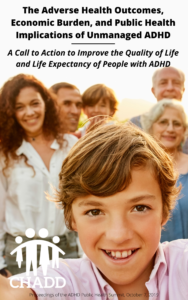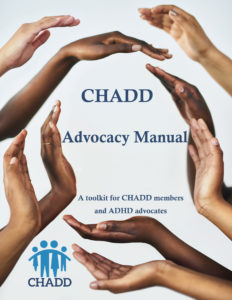Leading The Way: Adult ADHD Guidelines
The First Guidelines for the Clinical Diagnosis and Treatment of Adult ADHD in the United States
With no clinical practice guidelines, healthcare providers are not taught how to diagnose and treat ADHD in adults. This has created a significant gap in mental healthcare across the country.
The recent surge in adults seeking care for ADHD, coupled with a steady increase in ADHD medication prescriptions, has underscored the pressing need for consistent diagnostic and treatment guidelines for adults in the United States. Untreated ADHD has negative consequences across all aspects of society, and establishment of adult guidelines will ensure greater and more consistent access to care.
CHADD has partnered with the American Professional Society for ADHD and Related Disorders (APSARD) to develop and distribute guidelines in 2025. APSARD is leading the charge in developing the guidelines for review based on a firm foundation of research established by the Adult ADHD Quality Measures Initiative, which for the past five years has developed and tested metrics for the quality care of adults with ADHD.
CHADD, in partnership with the Adult ADHD Coalition, (consisting of representatives from the American Psychiatric Association, the American Association of Nurse Practitioners, the American Academy of Neurology, the American Psychological Association, the National Alliance on Mental Illness, and led by Dr. Peter Jensen, Founder and Board Chair of The REACH Institute), is developing and distributing the guidelines' educational toolkit. An accessible and interactive educational toolkit will reach all health care providers and therapists on the front lines of diagnosis and treatment -- not just those who specialize in ADHD.
RESEARCH
FEATURED WEBINARS
Analysis and Impact of Federal Healthcare and Education Policies
Several proposed federal policies have the potential to affect ADHD diagnosis, treatment, and educational support for individuals and families. Experts in ADHD diagnosis and treatment will review research-based responses to the Make America Healthy Again (MAHA) Commission's claims about ADHD. They will also discuss the critical role the US Department of Education plays in supporting students who have ADHD.
The Importance of Adult ADHD Guidelines
Dr. Peter Jensen, founder and Board Chair of the REACH Institute, is the director of a coalition of national organizations that are developing adult ADHD diagnosis and treatment guidelines for use in the United States, a joint effort of CHADD and APSARD.
For more information on the development of adult guidelines, read The Quest for Clinical Practice Guidelines for ADHD in Adults.
ADULT ADHD GUIDELINES DEVELOPMENT UPDATES
In 2022, CHADD received funds from a generous donor to sponsor and support the development of national guidelines in the U.S. for the diagnosis and treatment of adult ADHD. This milestone has been achieved due to the sustained efforts of our Public Policy Committee and builds on the committee’s published recommendations emerging from a national…
CHADD and Russell A. Barkley, Ph.D., Partner Announce New Findings Lanham, Md. (Jan. 8, 2019)— The message is clear. Treatment for attention-deficit/hyperactivity disorder (ADHD), along with the related health risks it poses, has the possibility of adding an average of nine to 13 years to the lifespan of children and adults diagnosed with ADHD. This…
- « Previous
- 1
- 2
RESOURCES
WHITE PAPER
 The Adverse Health Outcomes, Economic Burden, and Public Health Implications of Unmanaged Attention Deficit Hyperactivity Disorder (ADHD): A Call to Action to Improve the Quality of Life and Life Expectancy of People with ADHD
The Adverse Health Outcomes, Economic Burden, and Public Health Implications of Unmanaged Attention Deficit Hyperactivity Disorder (ADHD): A Call to Action to Improve the Quality of Life and Life Expectancy of People with ADHD
Proceedings of the ADHD Public Health Summit
Washington, DC
October 7, 2019
Presented by Children and Adults with Attention-Deficit/ Hyperactivity Disorder (CHADD)

 CHADD Advocacy Manual
CHADD Advocacy Manual